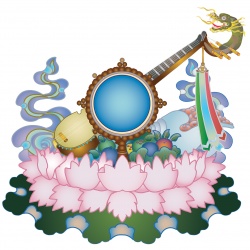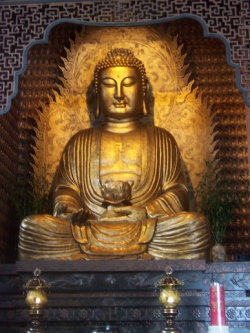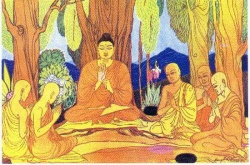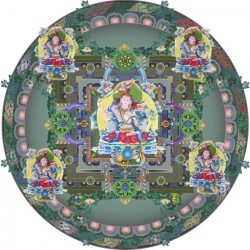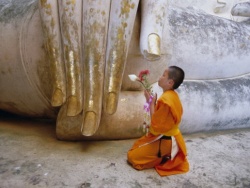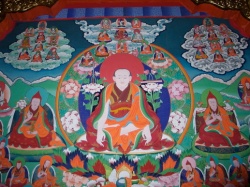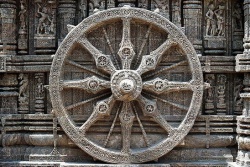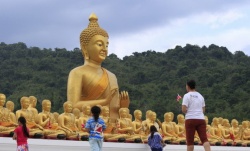Difference between revisions of "Utpaladeva"
| Line 1: | Line 1: | ||
| + | <nomobile>{{DisplayImages|2093|1738|3160|3196|1398|358|291|3484|2098|4187}}</nomobile> | ||
| + | |||
| + | |||
| Line 13: | Line 16: | ||
| − | VERY little is known about [[Utpala]], the great [[mystic]] [[Saint]] of [[Kashmir]], except that he might have lived somewhere in Nauhatta (Navyut) in [[Srinagar | + | VERY little is known about [[Utpala]], the great [[mystic]] [[Saint]] of [[Kashmir]], except that he might have lived somewhere in Nauhatta (Navyut) in [[Srinagar]]. |
| + | From some authors on [[Kashmir Shaivism]] and his contemporaries we find that he was a [[Brahmin]] and lived a [[married]] [[life]] around the middle of 900 A.D. He was the son of [[Udayakar]]. | ||
| + | |||
| + | |||
| + | Utpaladeva must have been a precocious boy with a sharp [[intellect]] and a quest for {{Wiki|learning}}. | ||
| + | |||
| + | This becomes evident from the fact that he was taken as a [[disciple]] by the great [[philosopher]]. [[Siddha]] [[Somananda]], whose great work [[Shivadrishti]], the [[Pratyabhijnya Shastra]] ([[Philosophy of Recognition]]), inspired him to write the [[Ishwar Pratyabhijnya Karikas]]. | ||
| + | |||
| + | It is stated in the [[Shivadrishti]] that [[Utpala]] was motivated to write the [[Karikas]] on the request of his son, [[Vibhramakara]]. | ||
| + | |||
| + | Therein he summarized the teachings of his [[master]] and this work is spoken of as "the {{Wiki|reflection}} of [[wisdom]] [[taught]] by [[Somananda]]". [[Kashmiri's]] [[Persian]]-knowing [[scholars]] have termed it is [[Khird-e-Kamil]] ([[wisdom]] of the [[Wikipedia:Sage (sophos|sage]]). | ||
| − | |||
Mass of {{Wiki|Literature}} | Mass of {{Wiki|Literature}} | ||
| − | Together with the various commentaries there grew up a {{Wiki|mass}} of {{Wiki|literature}} around these [[Karikas]] (also called [[Sutras]]) of Utpaladeva. Thus, Pratyabhijnya assumed such an important position that the whole system of the [[Kashmir | + | |
| + | Together with the various commentaries there grew up a {{Wiki|mass}} of {{Wiki|literature}} around these [[Karikas]] (also called [[Sutras]]) of [[Utpaladeva]]. | ||
| + | |||
| + | Thus, [[Pratyabhijnya]] assumed such an important position that the whole system of the [[Kashmir Shaiva philosophy]] has come to be known, outside [[Kashmir]] also, as the [[Pratyabhijnya Darshana]]. | ||
| + | |||
| + | Even at {{Wiki|present}} [[scholars]] from foreign lands [[taking up]] research work in the [[Pratybhijnya school of thought]] come to [[Kashmir]] to seek help and guidance from [[Shaivacharya Swami Lakshman Joo]], the living [[Yogi]] and [[Jivanmukta]] ({{Wiki|liberated}} while assuming [[body]]) at [[Ishaber]], [[Nishat]] ([[Srinagar]]). | ||
| − | Although Ishwar Pratyabhijnya is heavy to study, yet it is a {{Wiki|perfect}} work on [[philosophy]]. It is not only a set of [[philosophic]] [[doctrines]] but contains instructions on {{Wiki|practical}} [[Yoga]] also. This is [[preached]] for the aspirants of [[highest]] calibre who have developed acute [[awareness]]. None of the means (Shambhavopaya, Shaktopaya and Anavopaya) is recognised in this [[philosophy]]. Only the five functions are to be followed. The [[doctrine]] advocates <verse>. | + | Although [[Ishwar Pratyabhijnya]] is heavy to study, yet it is a {{Wiki|perfect}} work on [[philosophy]]. |
| + | |||
| + | It is not only a set of [[philosophic]] [[doctrines]] but contains instructions on {{Wiki|practical}} [[Yoga]] also. | ||
| + | |||
| + | This is [[preached]] for the aspirants of [[highest]] calibre who have developed acute [[awareness]]. | ||
| + | |||
| + | None of the means ([[Shambhavopaya]], [[Shaktopaya]] and [[Anavopaya]]) is recognised in this [[philosophy]]. Only the five functions are to be followed. The [[doctrine]] advocates <verse>. | ||
| Line 29: | Line 52: | ||
| − | Since there is [[no existence]] of [[impurity]], whence can there be any erosion. It is only a change in the point of view. Nothing has happened to [[Shiva]]; no Jiva-bhava has been assumed by Him. | + | Since there is [[no existence]] of [[impurity]], whence can there be any erosion. It is only a change in the point of view. Nothing has happened to [[Shiva]]; no [[Jiva-bhava]] has been assumed by Him. |
| − | Somananda has explained the [[doctrine]] to [[Utpala]] with the following example: | + | [[Somananda]] has explained the [[doctrine]] to [[Utpala]] with the following example: |
| − | A girl and a boy whose [[marriage]] has been fixed by their relatives and who have not seen each other happen to sit together along with their friends and relatives at a fair | + | A girl and a boy whose [[marriage]] has been fixed by their relatives and who have not seen each other happen to sit together along with their friends and relatives at a fair. |
| − | [[Tradition]] has it that [[Utpala]], in the later period of his [[life]], would often be in [[ecstasy]]. He would sing rapturous notes, intensely musical and {{Wiki|pregnant}} with meaning. These, verily, reveal the [[heart]] of [[Utpala]]. His [[poems]] give expression to the [[philosophical]] [[doctrines]] of [[Kashmir Shaivism]] known as [[Trika system | + | The girl happens to serve refreshments to the boy. |
| + | |||
| + | As a {{Wiki|matter}} of course, there is no special [[feeling]] between the two. | ||
| + | |||
| + | But, when an acquaintance comes and hints at the would-be [[marriage]] of the couple, at once [[feelings]] of [[love]] run through both the boy and the girl. The girl [[recognizes]] her lover. | ||
| + | |||
| + | Such is the {{Wiki|recognition}} of [[Jiva]] with [[Shiva]]. | ||
| + | |||
| + | This is [[Pratyabhijnya philosophy]] in the nutshell, as [[preached]] comprehensively by [[Utpala]]. | ||
| + | |||
| + | He sat and wrote these abstuse {{Wiki|aphorisms}} on the [[philosophy]] in [[calm]] moments. This was his self-introspection. | ||
| + | |||
| + | [[Tradition]] has it that [[Utpala]], in the later period of his [[life]], would often be in [[ecstasy]]. | ||
| + | |||
| + | He would sing rapturous notes, intensely musical and {{Wiki|pregnant}} with meaning. | ||
| + | |||
| + | These, verily, reveal the [[heart]] of [[Utpala]]. | ||
| + | |||
| + | His [[poems]] give expression to the [[philosophical]] [[doctrines]] of [[Kashmir Shaivism]] known as [[Trika system of philosophy]] in a devotional [[form]]. These occupy the same place in this system as the [[Vedanta]] [[Stotras]] do in the [[Vedanta]] [[philosophy]]. | ||
| Line 43: | Line 84: | ||
| − | Utpala's [[philosophy]] is as deep as that of [[Wikipedia:Adi Shankara|Adi Sankara]], though, perhaps, more devotional | + | [[Utpala's]] [[philosophy]] is as deep as that of [[Wikipedia:Adi Shankara|Adi Sankara]], though, perhaps, more devotional. |
| + | He believes in [[self-surrender]] and [[love]]. He uttered his [[poems]] in [[ecstasy]] which were noted and written down by his [[disciples]]. | ||
| − | + | He was so deep in [[divine]] [[rapture]] that he had no [[body consciousness]] and when he came to it once and found almond blossoms strewn on the ground, he uttered; "O [[Shiva]], {{Wiki|Bhaktas}} have adorned You with [[flower]] wreathes. | |
| − | + | Only I fall back in adoring You", and instantly went into [[Samadhi]]. Again, while running in [[divine]] [[ecstasy]], his locks would get entangled in the low-hanging branches of [[trees]] and he would [[feel]] that [[Shiva]] was catching hold of him. | |
| + | He would then sit there and be in [[meditation]] for long periods. | ||
| − | Shivastotravali (or Utpala-Stotravali) is so [[soul]]- stirring that once you read these [[Shlokas]], you will continue to sing and muse on them. The ringing [[music]] in your [[ears]] will make you shed {{Wiki|tears}} of [[joy]] and forget yourself. Kashmir's [[Persian]] [[scholars]] have termed it as Jnoon-e-Kamil ([[divine | + | |
| + | [[Utpala's]] {{Wiki|poetic}} works were compiled by his [[disciples]] - {{Wiki|Sri Rama}} and [[Adityaraja]]. | ||
| + | |||
| + | Later a great [[scholar]], [[Vishwavasta]], divided these into 20 [[Stotras]] assigning a heading to each. | ||
| + | |||
| + | It is also said that [[Utpala]] himself had assigned the headings [[Sangrahastotra]], [[Jayastotra]] and [[Bhaktistotra]] to 13th, 14th and 15th [[Stotras]]. | ||
| + | |||
| + | This great work came to be known as [[Shivastotravali]] (a rosary of hymns to [[Shiva]]). | ||
| + | |||
| + | Commentary in [[Sanskrit]] has been written to this work of [[Utpala]] by [[Kshemraja]], the fourth in line of [[disciples]]. | ||
| + | |||
| + | [[Utpala]] was followed by his pupil [[Lakshmangupta]], who was the [[guru]] of [[Abhinavagupta]]. | ||
| + | |||
| + | |||
| + | [[Shivastotravali]] (or [[Utpala-Stotravali]]) is so [[soul]]- stirring that once you read these [[Shlokas]], you will continue to sing and muse on them. The ringing [[music]] in your [[ears]] will make you shed {{Wiki|tears}} of [[joy]] and forget yourself. | ||
| + | |||
| + | [[Kashmir's]] [[Persian]] [[scholars]] have termed it as [[Jnoon-e-Kamil]] ([[divine ecstasy sage]]). | ||
| + | |||
| + | A stir is [[experienced]] while singing: | ||
"O Lord'! Stand by my side and listen to the [[definition]] in brief of [[pleasure]] and [[pain]]. What is union with The is [[pleasure]] and what is separation from Thee is [[pain]]." | "O Lord'! Stand by my side and listen to the [[definition]] in brief of [[pleasure]] and [[pain]]. What is union with The is [[pleasure]] and what is separation from Thee is [[pain]]." | ||
| + | |||
Isolational [[Joy]] | Isolational [[Joy]] | ||
| − | Here you have the [[feeling]] of isolational [[joy]] that you [[experience]] by listening to the shrill {{Wiki|voice}} of a morning bird or the continuous flow of a waterfall. [[Utpala]], for all purposes, was a [[loving]] and [[pure]]- hearted [[mystic]]. As the chief [[characteristic]] of his [[language]] is [[symbolism]], he appeals to all [[sections]] of [[people]]. He has the power to penetrate [[human]] [[feelings]] and enraptures one with his dynamic {{Wiki|touch}}. His great utterance to this effect is: | + | |
| + | Here you have the [[feeling]] of isolational [[joy]] that you [[experience]] by listening to the shrill {{Wiki|voice}} of a morning bird or the continuous flow of a waterfall. [[Utpala]], for all purposes, was a [[loving]] and [[pure]]- hearted [[mystic]]. | ||
| + | |||
| + | As the chief [[characteristic]] of his [[language]] is [[symbolism]], he appeals to all [[sections]] of [[people]]. He has the power to penetrate [[human]] [[feelings]] and enraptures one with his dynamic {{Wiki|touch}}. His great utterance to this effect is: | ||
"O Lord! I may have increased [[desire]] for the [[objective world]] like other [[people]] but with this difference that I shall look upon it as Thyself without any [[idea]] of [[duality]]." | "O Lord! I may have increased [[desire]] for the [[objective world]] like other [[people]] but with this difference that I shall look upon it as Thyself without any [[idea]] of [[duality]]." | ||
| − | The available works of Utpaladevacharya are as follows: | + | The available works of [[Utpaladevacharya]] are as follows: |
| − | + | [[Pratyabhijnya Karikas]] (or [[Sutras]]); | |
| − | Shivastotravali (with Kshemaraja's [[Sanskrit]] commentary and {{Wiki|Hindi}} commentary by [[Swami] | + | [[Shivastotravali]] (with [[Kshemaraja's]] [[Sanskrit]] commentary and {{Wiki|Hindi}} commentary by [[Swami] Lakshman Joo]]); and |
| − | Ishwara-Siddhi and Ajadapromatri-Siddhi. | + | [[Ishwara-Siddhi]] and [[Ajadapromatri-Siddhi]]. |
{{R}} | {{R}} | ||
http://www.koausa.org/Saints/Utpaladeva/article1.html | http://www.koausa.org/Saints/Utpaladeva/article1.html | ||
[[Category:Buddhist philosophers]] | [[Category:Buddhist philosophers]] | ||
Revision as of 02:40, 21 January 2016
Utpaladeva (ca. AD 900–950) was one of the great teachers of the philosophy of Kashmir Shaivism.
Utpaladeva, an influential philosopher-theologian of the Pratyabhijna school of Shaiva thought composed the Ishvara-pratyabhijna-karika, or 'Verses on the Recognition of the Lord' and the 'Shivastotravali'.
Utpaladeva and his Pratyabhijnya Philosophy - Jankinath Kaul Koshur Samachar
VERY little is known about Utpala, the great mystic Saint of Kashmir, except that he might have lived somewhere in Nauhatta (Navyut) in Srinagar.
From some authors on Kashmir Shaivism and his contemporaries we find that he was a Brahmin and lived a married life around the middle of 900 A.D. He was the son of Udayakar.
Utpaladeva must have been a precocious boy with a sharp intellect and a quest for learning.
This becomes evident from the fact that he was taken as a disciple by the great philosopher. Siddha Somananda, whose great work Shivadrishti, the Pratyabhijnya Shastra (Philosophy of Recognition), inspired him to write the Ishwar Pratyabhijnya Karikas.
It is stated in the Shivadrishti that Utpala was motivated to write the Karikas on the request of his son, Vibhramakara.
Therein he summarized the teachings of his master and this work is spoken of as "the reflection of wisdom taught by Somananda". Kashmiri's Persian-knowing scholars have termed it is Khird-e-Kamil (wisdom of the sage).
Mass of Literature
Together with the various commentaries there grew up a mass of literature around these Karikas (also called Sutras) of Utpaladeva.
Thus, Pratyabhijnya assumed such an important position that the whole system of the Kashmir Shaiva philosophy has come to be known, outside Kashmir also, as the Pratyabhijnya Darshana.
Even at present scholars from foreign lands taking up research work in the Pratybhijnya school of thought come to Kashmir to seek help and guidance from Shaivacharya Swami Lakshman Joo, the living Yogi and Jivanmukta (liberated while assuming body) at Ishaber, Nishat (Srinagar).
Although Ishwar Pratyabhijnya is heavy to study, yet it is a perfect work on philosophy.
It is not only a set of philosophic doctrines but contains instructions on practical Yoga also.
This is preached for the aspirants of highest calibre who have developed acute awareness.
None of the means (Shambhavopaya, Shaktopaya and Anavopaya) is recognised in this philosophy. Only the five functions are to be followed. The doctrine advocates <verse>.
No Impurity
Since there is no existence of impurity, whence can there be any erosion. It is only a change in the point of view. Nothing has happened to Shiva; no Jiva-bhava has been assumed by Him.
Somananda has explained the doctrine to Utpala with the following example:
A girl and a boy whose marriage has been fixed by their relatives and who have not seen each other happen to sit together along with their friends and relatives at a fair.
The girl happens to serve refreshments to the boy.
As a matter of course, there is no special feeling between the two.
But, when an acquaintance comes and hints at the would-be marriage of the couple, at once feelings of love run through both the boy and the girl. The girl recognizes her lover.
Such is the recognition of Jiva with Shiva.
This is Pratyabhijnya philosophy in the nutshell, as preached comprehensively by Utpala.
He sat and wrote these abstuse aphorisms on the philosophy in calm moments. This was his self-introspection.
Tradition has it that Utpala, in the later period of his life, would often be in ecstasy.
He would sing rapturous notes, intensely musical and pregnant with meaning.
These, verily, reveal the heart of Utpala.
His poems give expression to the philosophical doctrines of Kashmir Shaivism known as Trika system of philosophy in a devotional form. These occupy the same place in this system as the Vedanta Stotras do in the Vedanta philosophy.
Utpala's philosophy is as deep as that of Adi Sankara, though, perhaps, more devotional.
He believes in self-surrender and love. He uttered his poems in ecstasy which were noted and written down by his disciples.
He was so deep in divine rapture that he had no body consciousness and when he came to it once and found almond blossoms strewn on the ground, he uttered; "O Shiva, Bhaktas have adorned You with flower wreathes.
Only I fall back in adoring You", and instantly went into Samadhi. Again, while running in divine ecstasy, his locks would get entangled in the low-hanging branches of trees and he would feel that Shiva was catching hold of him.
He would then sit there and be in meditation for long periods.
Utpala's poetic works were compiled by his disciples - Sri Rama and Adityaraja.
Later a great scholar, Vishwavasta, divided these into 20 Stotras assigning a heading to each.
It is also said that Utpala himself had assigned the headings Sangrahastotra, Jayastotra and Bhaktistotra to 13th, 14th and 15th Stotras.
This great work came to be known as Shivastotravali (a rosary of hymns to Shiva).
Commentary in Sanskrit has been written to this work of Utpala by Kshemraja, the fourth in line of disciples.
Utpala was followed by his pupil Lakshmangupta, who was the guru of Abhinavagupta.
Shivastotravali (or Utpala-Stotravali) is so soul- stirring that once you read these Shlokas, you will continue to sing and muse on them. The ringing music in your ears will make you shed tears of joy and forget yourself.
Kashmir's Persian scholars have termed it as Jnoon-e-Kamil (divine ecstasy sage).
A stir is experienced while singing:
"O Lord'! Stand by my side and listen to the definition in brief of pleasure and pain. What is union with The is pleasure and what is separation from Thee is pain."
Isolational Joy
Here you have the feeling of isolational joy that you experience by listening to the shrill voice of a morning bird or the continuous flow of a waterfall. Utpala, for all purposes, was a loving and pure- hearted mystic.
As the chief characteristic of his language is symbolism, he appeals to all sections of people. He has the power to penetrate human feelings and enraptures one with his dynamic touch. His great utterance to this effect is:
"O Lord! I may have increased desire for the objective world like other people but with this difference that I shall look upon it as Thyself without any idea of duality."
The available works of Utpaladevacharya are as follows:
Pratyabhijnya Karikas (or Sutras);
Shivastotravali (with Kshemaraja's Sanskrit commentary and Hindi commentary by [[Swami] Lakshman Joo]]); and
Ishwara-Siddhi and Ajadapromatri-Siddhi.

